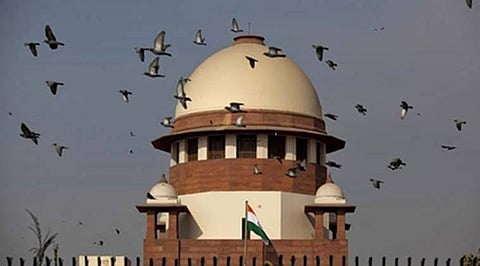

The Supreme Court in a significant judgment delivered on Wednesday issued a slew of directions for payment of interim maintenance and the criteria to be followed in determining the quantum of maintenance in matrimonial cases.
It also issued guidelines to be adhered to by family courts, district courts and magistrate courts across the country to overcome the issue of overlapping jurisdiction and avoid conflicting orders being passed in different proceedings.
A two-judge bench of Justices Indu Malhotra and Subhash B Reddy prescribed an affidavit annexed to their judgment, which will be filed by both parties in all maintenance proceedings, including pending proceedings before the concerned Family Court / District Court / Magistrates Court, as the case may be, throughout the country, disclosing Assets and Liabilities.
The bench listed out the following criteria for determining the quantum of maintenance-
Age and employment of parties
"This is of particular relevance in contemporary society, given the highly competitive industry standards, the separated wife would be required to undergo fresh training to acquire marketable skills and re-train herself to secure a job in the paid workforce to rehabilitate herself. With advancement of age, it would be difficult for a dependant wife to get an easy entry into the work-force after a break of several years", the Court said.
Right to residence
The Court said the living of the aggrieved woman in the shared household must have a degree of permanence. A fleeting or casual living at different places would not constitute a "shared household".
It is important, the Court said, to consider the intentions of the parties, nature of living, and nature of the household, to determine whether the premises is a "shared household".
Referring to Section 2(s) read with Sections 17 and 19 of the Domestic Violence Act, 2005, the Court said this entitles a woman to the right of residence in a shared household, irrespective of her having any legal interest in the same.
"There is no requirement of law that the husband should be a member of the joint family, or that the household must belong to the joint family, in which he or the aggrieved woman has any right, title or interest. The shared household may not necessarily be owned or tenanted by the husband singly or jointly", the Court held.
It added while passing such an order, the Magistrate may direct the respondent to pay the rent and other payments, having regard to the financial needs and resources of the parties.
Where wife is earning some income
The bench said an earning wife cannot operate as a bar from being awarded maintenance by the husband. The onus is on the husband to establish with necessary material that there are sufficient grounds to show that he is unable to maintain the family, and discharge his legal obligations for reasons beyond his control. If the husband does not disclose the exact amount of his income, an adverse inference may be drawn by the Court.
Maintenance of minor children
The Court said the living expenses of the child would include expenses for food, clothing, residence, medical expenses, education of children. Extra coaching classes or any other vocational training courses to complement the basic education must be factored in, while awarding child support. Albeit, it should be a reasonable amount to be awarded for extra-curricular/coaching classes and not an overly extravagant amount which may be claimed.
The education expenses of the children must be normally borne by the father. If the wife is working and earning sufficiently, the expenses may be shared proportionately between the parties, the Court said.
Serious disability or ill health
Serious disability or ill health of a spouse, child/children from the marriage/dependant relative who requires constant care and recurrent expenditure, would also be a relevant consideration while quantifying maintenance
The Court made it clear that these are not the exhaustive criterion, and the concerned Court may exercise its discretion to consider any other factor/s which may be necessary or of relevance in the facts and circumstances of a case.
It also held that maintenance would be awarded from the date of the application.
On the issue of enforcement of Orders of Maintenance, the Court held that the order or decree of maintenance may be enforced like a decree of a civil court, through the provisions which are available for enforcing a money decree, including civil detention, attachment of property, etc. as provided by various provisions of the CPC.
"Striking off the defence of the respondent is an order which ought to be passed in the last resort if the Courts find default to be wilful and contumacious, particularly to a dependant unemployed wife, and minor children. Contempt proceedings for wilful disobedience may be initiated before the appropriate Court", the Court held.
To avoid the overlapping of the jurisdiction, the Court suggested that where successive claims for maintenance are made by a party under different statutes, the Court would consider an adjustment or setoff, of the amount awarded in the previous proceeding/s, while determining whether any further amount is to be awarded in the subsequent proceeding.
It also said that it would be mandatory for the applicant to disclose the previous proceeding and the orders passed therein, in the subsequent proceeding and if the order passed in the previous proceeding/s requires any modification or variation, it would be required to be done in the same proceeding.
(Sukhman Sandhu is a student of Rajiv Gandhi National University of Law, Punjab, India and an intern with The Leaflet.)
http://theleaflet.in/wp-content/uploads/2020/11/Supreme-Court_Order_Maintenance_Matrimonial-Cases.pdf